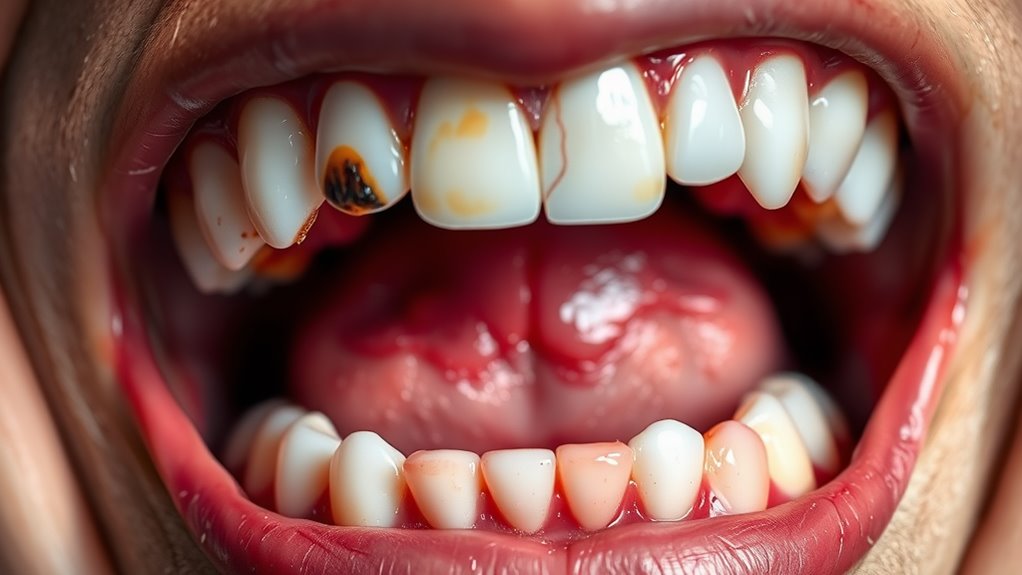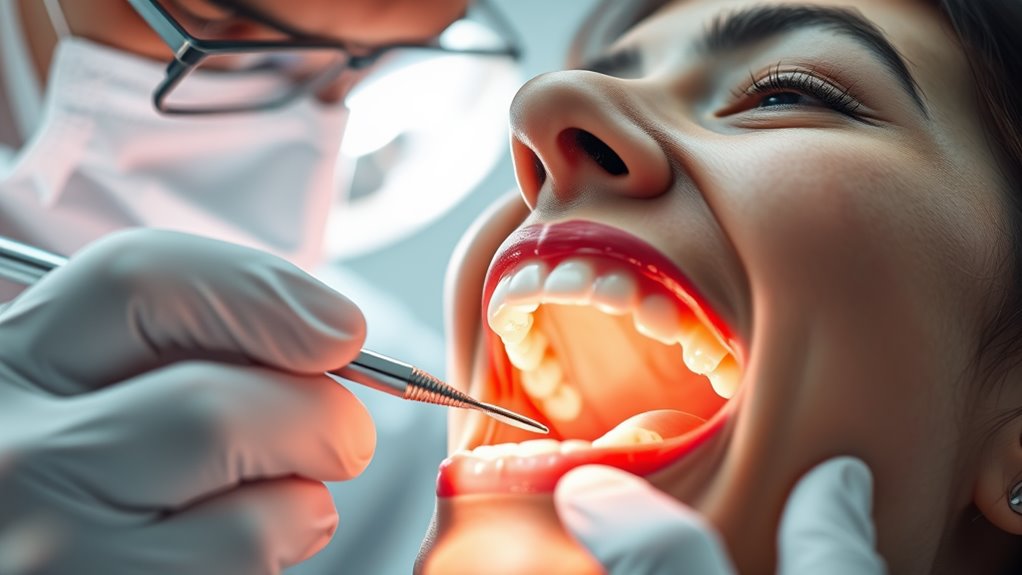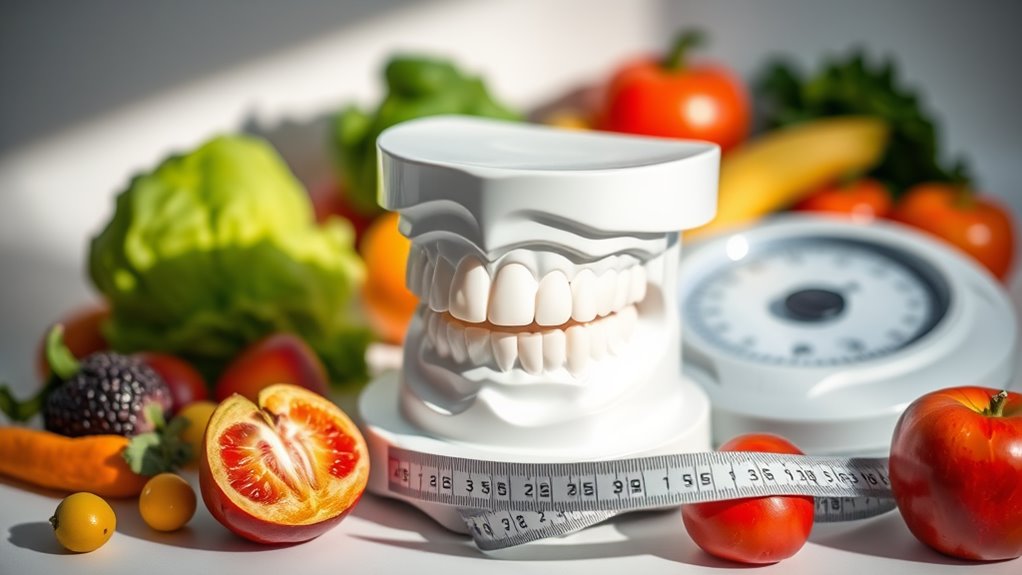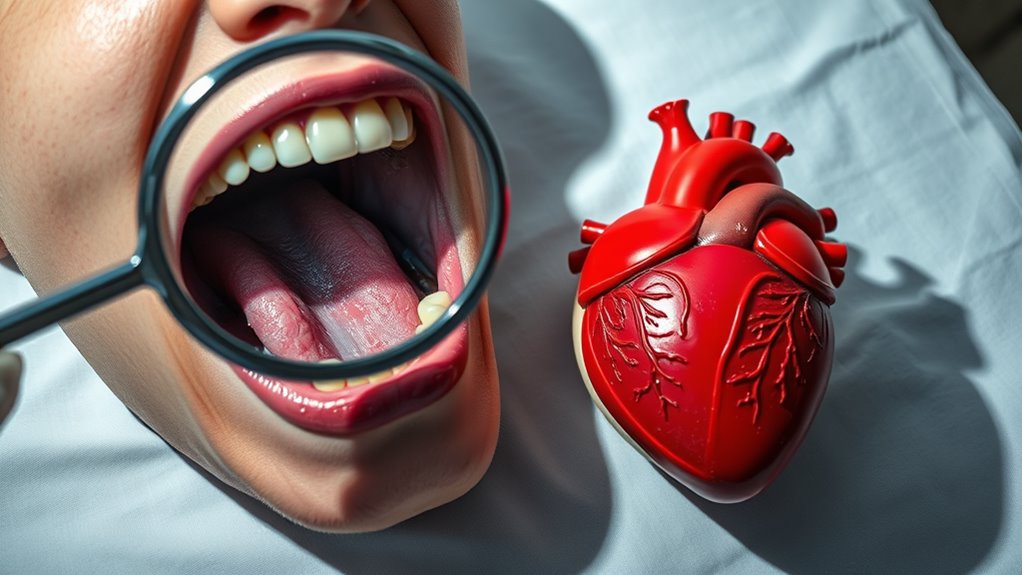Oral Health Warning Signs You Should NEVER Ignore!
Your mouth can tell you a lot about your health through key warning signs you shouldn’t ignore. Watch out for bleeding or swollen gums, persistent bad breath, tooth sensitivity, and visible changes like white spots or dark patches. If you experience severe pain, facial swelling, or knocked-out teeth, seek emergency care immediately. Understanding these crucial signals can help prevent serious complications and protect your overall wellbeing.
Understanding the Red Flags of Gum Disease
How can you tell if your gums are trying to warn you about potential problems? Your gums provide clear signals when something’s wrong. If you notice redness, swelling, or tenderness, it’s time to pay attention.
Bleeding during brushing or flossing is another major red flag that shouldn’t be ignored.
Watch out for gums that appear to be pulling away from your teeth, creating deeper pockets where bacteria can thrive. Bad breath that won’t go away, despite good oral hygiene, often indicates gum disease.
You might also experience loose teeth or changes in how your teeth fit together when biting. If you spot any of these warning signs, don’t wait – schedule a dental appointment immediately. Early intervention can prevent minor gum issues from developing into serious periodontal disease.
What Your Breath Is Trying to Tell You
What’s lurking behind your bad breath? While morning breath and garlic-induced odors are temporary, persistent bad breath can signal serious health issues.
If you’re battling chronic bad breath despite good oral hygiene, your body might be warning you about underlying problems.
Persistent bad breath can indicate gum disease, tooth decay, or oral infections. It might also reveal systemic conditions like diabetes, kidney problems, or gastrointestinal disorders.
A white-coated tongue could mean you’re harboring bacteria, while fruity-smelling breath might signal diabetic ketoacidosis. Ammonia-like breath could point to kidney issues, and acid reflux often causes a sour taste paired with unpleasant breath.
Don’t ignore these warning signs. If your bad breath persists after improving oral hygiene, schedule a dental check-up to identify the root cause.
Decoding Tooth Pain and Sensitivity
When that sharp zing strikes your teeth while enjoying ice cream or hot coffee, it’s more than just an inconvenience. This sensitivity often signals exposed dentin, worn enamel, or receding gums that need attention.
Don’t ignore these warning signs, as they can indicate developing cavities or more serious dental issues.
If you’re experiencing persistent tooth pain, especially when biting down or chewing, you might’ve a cracked tooth or deep decay.
Throbbing pain that wakes you at night could point to an infection or abscess requiring immediate care.
Pay attention to pain patterns – sensitivity that lingers after temperature changes or worsens over time isn’t normal.
Your dentist can identify the root cause and recommend appropriate treatments, from desensitizing toothpaste to more comprehensive dental work.
Visible Changes That Signal Dental Problems
Your mouth can reveal early warning signs of dental problems through visible changes that shouldn’t be ignored. Regular self-examination of your teeth, gums, and tongue can help you spot potential issues before they become serious complications.
When checking your mouth, use a bright light and look for changes in color, texture, or appearance.
- White or dark spots on teeth may indicate decay or the beginning stages of cavities
- Swollen, red, or bleeding gums could signal gingivitis or periodontal disease
- Changes in tongue color or development of patches might suggest vitamin deficiencies or infections
- Visible pits, chips, or cracks in teeth can lead to sensitivity and further damage
If you notice any of these changes, don’t wait to schedule a dental appointment. Early intervention can prevent more extensive treatment later.
When to Seek Emergency Dental Care
Recognizing true dental emergencies can mean the difference between saving and losing a tooth.
You’ll need immediate care if you’ve knocked out a tooth, severely cracked or broken it, or have an abscess with facial swelling. Don’t delay if you’re experiencing uncontrollable bleeding or severe pain that keeps you awake.
If your tooth gets knocked out, keep it moist in milk or saliva and see a dentist within 30 minutes.
For severe infections causing fever and difficulty breathing or swallowing, head to the emergency room. You should also seek urgent care for injuries to your jaw, especially if you can’t close your mouth properly.




